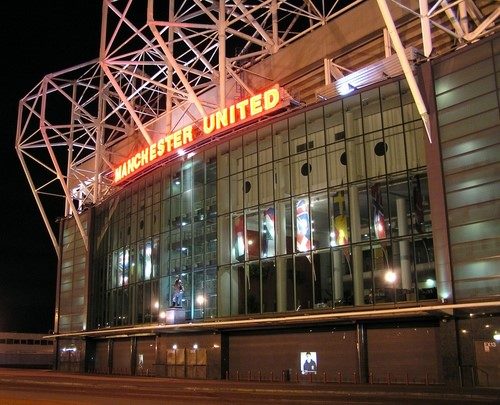Four North West teams in world football’s top 20 revenue generating league

Manchester City, Manchester United, Everton and Liverpool are in the Football Money League Top 20 clubs.
The 23rd Deloitte Sports Business Group Football Money League reveals the top 20 highest revenue generating football clubs for the 2018/19 season, with combined revenues growing 11% to £8.2bn, a new record.
Spanish giants Barcelona top the league for the first time and also becomes the first club to break the €800m barrier. The club generated £741.1m in the 2018-19 season.
Real Madrid drops to second, generating revenue of £667.5m, with the gap between first and second place the highest in the publication’s history.
Manchester United retained their third spot, with revenues of £627.1m, up from £589.8m.
Manchester City dropped from fifth spot to sixth, with revenues of £538.2m, up from £503.5m.
Liverpool were static in seventh place on £533m, compared with £455.1m.
And Everton dropped from 17th to 19th spot with revenues of £187.7m compared with £188.6m the previous season.
Other English clubs featuring in the table included Tottenham Hotspur at eight slot (£459.3m), Chelsea at ninth (£452.2m), Arsenal 11th (£392.7m), and West Ham 18th (£190.7m).
Broadcast remains the largest individual revenue stream, comprising 44% of total revenue.
The ability to attract substantial commercial interest is a distinguishing factor between those at the top – ie those traditionally competing in the UEFA Champions League on a regular basis – and at the bottom of the Money League.
It is notable that while an extended period of absence from UEFA club competitions, in particular the Champions League, can significantly impact revenue generation, the top ranked clubs are less reliant on broadcast revenue than smaller clubs.
Dan Jones, partner in the Sports Business Group at Deloitte, said: “Growth in the football industry continues to outpace that in other sectors, and the top 20 Money League clubs are on track to generate over €10bn collectively in a single year in the near future.
“What is notable in this edition of the Money League is the apparent continuing emergence of ‘mini-leagues within the Money League’, as the largest revenue-generating clubs continue to pull away from the rest.”
FC Barcelona’s revenue increase can largely be attributed to the club’s change in approach to operations, with the decision to bring merchandising and licensing activities in-house a primary factor.
Recognising the power of its brand, the club has taken greater control of its merchandising and licensing operations, rather than relying on third parties for these services.
This has given the club additional control over how its products are promoted and sold and the ability to report this revenue on a gross, rather than a net, basis.
Jones added: “Barca is a clear example of a club adapting to changing market conditions, reducing the reliance on broadcast revenue and focusing on growing revenues within its control.
“The club’s commercial operation generated €383.5m of revenue, which is more than the total revenue of the 12th placed club in this year’s Money League.
“With the club expecting further growth of €30m in commercial revenues and total revenue of almost €880m in 2019/20, we expect them to retain the top spot in next year’s edition. Barca is on course to achieve its stated ambition to be the first €1bn Money League club in years to come.”
The Premier League continues to contribute the most clubs to the Money League top 20, with eight clubs making the cut in this year’s edition.
Manchester United remains in third with revenue of £627.1m but currently forecasts revenue of £560-580m in 2019/20 as a result of not qualifying for this season’s Champions League, a result that would likely see the Red Devils fall to their lowest ever Money League position in next year’s edition.
This could also put the club at risk of losing its position as the Premier League’s highest revenue generating club for the first time in Money League history.
United’s closest domestic rivals, Manchester City and Liverpool, generated revenues of £538.2m and £533m, respectively in 2018/19.
Liverpool’s long-term ambitions of a top five Money League position in future editions are not unrealistic, particularly if the club can build on its recent on-pitch success in the Premier League and in winning the 2019 UEFA Champions League.
Sam Boor, senior manager in the Sports Business Group at Deloitte, said: “The impact of participation and performance in UEFA club competitions on revenue is evident in London and the North West, with the rise of Liverpool, Manchester City and Spurs driven by reaching the Champions League knockout stages.
“The relative decline of Arsenal is a direct result of not participating in the competition for a second consecutive season, a fate that may also befall Manchester United.”
In the last five years the collective broadcast revenue of the top 20 clubs has grown at a compound annual growth rate of 11%, the most of any of the revenue streams.
Whether the largest football leagues have now reached a plateau in broadcast rights value is debatable, however, broadcast revenue generation is ultimately out of the control of an individual club.
To achieve differentiated revenue growth in the future, clubs will need to focus on maximising the revenue streams that they have the most influence over. Their challenge is to do so at a time where the future landscape for football looks more unpredictable than ever.
Boor concluded: “The Champions League Round of 16 draw for the 2019/20 season, much like the Money League top 20, consists only of teams from Europe’s ‘big five’ leagues.
“Key stakeholders in the game will be alert to the importance of preserving unpredictability of footballing outcomes as a key driver of long-term and sustainable value.”

![PPV.FREE ! Ways To Watch Los Angeles Lakers vs Minnesota Timberwolves Game 3 Live Streams NBA Playoffs [PPV] and TV Channel](https://www.thebusinessdesk.com/northwest/wp-content/themes/thebusinessthemeMKII/assets/images/bg-white.png)




